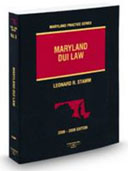The Supreme Court today announced its opinion in Missouri v. McNeely and ruled that police in DUI investigations may not automatically avoid seeking a search warrant to obtain a blood sample where the defendant does not consent to a blood test. This is the third win as amicus curiae for the National College for DUI Defense which filed an amicus brief with the National Association of Criminal Defense Lawyers.
The Court said:
In those drunk-driving investigations where police officers can reasonably obtain a warrant before a blood sample can be drawn without significantly undermining the efficacy of the search, the Fourth Amendment mandates that they do so. See McDonald v. United States, 335 U. S. 451, 456 (1948) (“We cannot . . . excuse the absence of a search warrant without a showing by those who seek exemption from the constitutional mandate that the exigencies of the situation made [the search] imperative”).
It is interesting counting the votes again.
With respect to the proposition that there is no per se DUI exception to the warrant requirement in so far as non-consensual blood tests are concerned, the vote is 8-1 (only Thomas dissented from the holding). Since that was the only basis urged by Missouri for decision, the Missouri Supreme Court was affirmed. Missouri never appealed the question of whether the officer in this case acted reasonably.
As a result, Justice Kennedy wouldn’t touch when and whether it might be reasonable for an officer to get blood without a warrant. He is willing to wait for the next case to do so. In so far as there was a discussion about how to determine when and whether an exigency exists there were 3 votes for kind of a special totality test where if the warrant couldn’t be obtained without any delay at all, then it might not be needed (Roberts, Alito & Breyer). But Sotomayor, Kagan, Scalia and Ginsburg disagreed with this approach.
Facts will be critical to deciding the next case, and if it is close, with the current majority, Kennedy could well be the swing vote.
In the meantime, by my analysis, warrantless non-consensual blood draws are currently in vogue in California, South Dakota, Nevada, Idaho and in the federal parks. I am not referring to cases where the defendant chooses blood over breath or urine. Non-consensual. Additionally, many states allow warrantless blood draws in fatal cases and in cases where the driver is unconscious or incapable of refusing. There is also a hint in the opinion that roadside blood draws would never be allowed. ALL of these blood draws are now subject to suppression under McNeely.
Other issues that will need to be litigated in future cases include possible misadvisement whether refusal to submit to a blood test can lead to administrative penalties, sentencing enhancements, or evidentiary inferences from refusal to submit to a blood test.
If you are facing criminal or traffic charges in Maryland state or
federal court, call Leonard R. Stamm of Goldstein
& Stamm, P.A. at 301-345-0122 for a free consultation.
Leonard R. Stamm
Goldstein & Stamm, P.A.
6301 Ivy Lane, Suite 504
Greenbelt, MD 20770
301-345-0122
(fax) 301-441-4652
www.dwiattorneymaryland.com
https://www.marylandduilawyer-blog.com
marylandduilaw@gmail.com
Author: West’s Maryland DUI Law

 Maryland DUI Lawyer Blog
Maryland DUI Lawyer Blog

